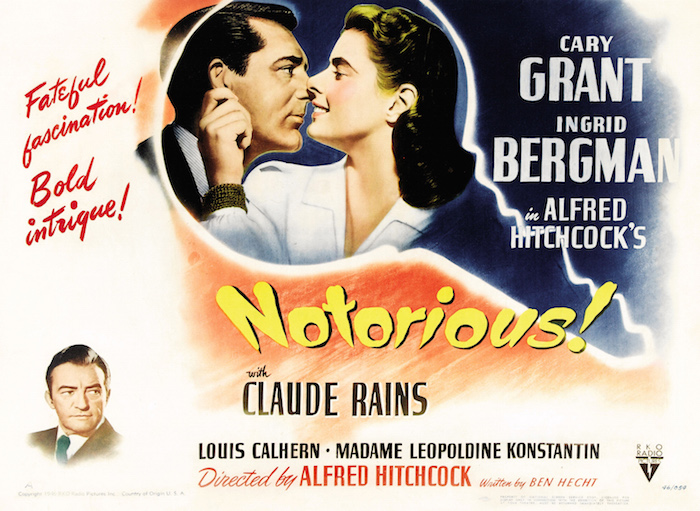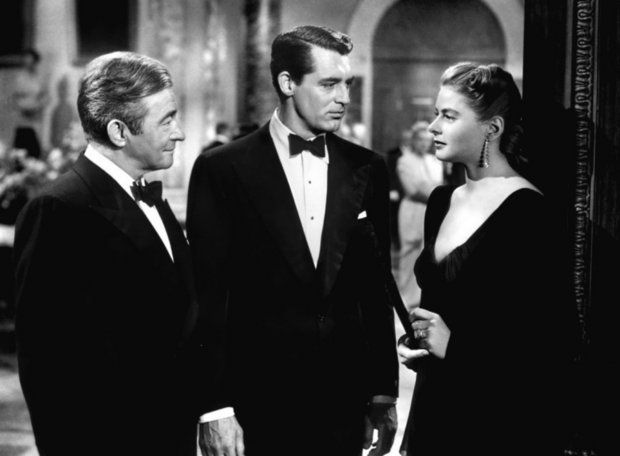Welcome back to our Ingrid Bergman Centennial... we accidentally took a week off. Here's Deborah on Hitchcock's Notorious (1946) - Editor

Notorious is Hitchcock’s only feminist film, and Alicia Huberman, as played by Ingrid Bergman, is the only Hitchcock heroine rewarded, rather than destroyed, for her sexual agency. Notorious pairs a tramp, which is what Alicia calls herself, with a misogynist, as Cary Grant’s Devlin says he’s always been afraid of women. Alicia, then, is not fighting Nazis, she’s fighting the patriarchy and its misogynist attraction/repulsion for female sexuality.
Everyone knows that Hitchcock coined “McGuffin” to mean the thing that everyone in the film cares about, but no one in the audience cares about. The example generally used is the radioactive sand from Notorious. But I’d argue that the entire Nazi plot, in fact World War II as a whole, is the McGuffin. This is a love story, a sex story, an awakening story, and, yes, a feminist story. [More...]
Alicia’s sexuality is a source of terror for men in general, as embodied by Devlin. When we meet her, Alicia is drinking and sleeping around in reaction to the way that men have made her life unlivable: Her father, the U.S. government representatives, and the reporters who hound her are all male. She is acting all sexually empowered, but she hates herself and wants an opportunity for redemption.
Enter Devlin. Unlike every other misogynist in Hitchcock’s extensive catalog, Devlin owns his own feelings; he has always feared women, he doesn’t blame Alicia for it. Nonetheless, he hates himself for falling for her.
The acting gets very amazing very quickly. Cary Grant is capable of giving Devlin prickliness and pettiness that offsets his considerable beauty. Bergman simply melts. She is simply the most wholehearted actress to ever occupy a screen. She throws her soul into her drinking, into her smug anger at men, and into falling in love with Devlin in the movie’s most luscious scene. She melts into everything; her despair at the way she is treated, her fear as she is being poisoned, all of it. It’s like she is made of liquid, barely able to stand on two feet as emotions fill her.
But we’re not done with the feminism, because now Alicia has to use her sexuality to fight Nazis, causing THE ENTIRE PATRIARCHY to feel very ambivalent indeed. In a pivotal scene, government stuffed shirts discuss Alicia’s work. They know that what Alicia is doing is loathsome and dangerous—and therefore heroic--yet they are disgusted with her for doing it. It’s not spying on Nazis that makes her an ambivalent figure, it’s using her sexuality to do so, and by extension, it’s being sexual. Devlin suddenly sees the hypocrisy and calls out the others. He praises Alicia for who and what she is. In that moment, he is not measuring her by whether or not she sleeps around, only by her honor and courage. When he first falls in love with Alicia, Devlin wants to tame her, but from here on out, he loves her for who she is, sexual agency and all.

Meanwhile, Alicia is being poisoned. The McGuffin reading is that it’s a murderous Nazi plot, but poison serves multiple symbolic purposes: Both as the fate of a “tramp” and as a parallel to the self-inflicted poison of her alcoholism. (There are first half/latter half parallels throughout Notorious that this essay has no room to discuss.)
It’s possible to read it all as anti-feminist: Alicia hates her own sexuality and uses it to punish herself, and is saved by the love of a good man. Blah. I don’t think so, though. The thing Alicia seems to hate the most is being looked at and judged. We first see her in Notorious being questioned and photographed by reporters; she wants to get away. Then she wants to get away from cops, then from people who spy on her. It’s always when she is being looked at and judged that she drinks. The judgmental gaze of the patriarchy is what poisons her, and when Devlin at last accepts her, she can be healed.
